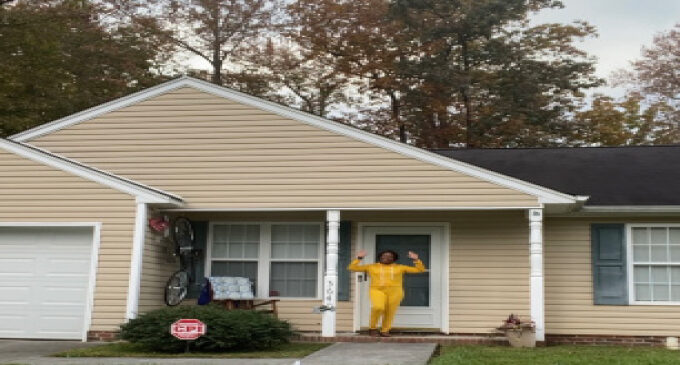County commissioner knows firsthand the value of the homeownership program
County Commissioner Tonya McDaniel in front of her house she bought through the homeownership program.

By John Railey
Forsyth County Commissioner Tonya McDaniel knows the value of the county’s homeownership program firsthand: In 2010, she bought her home through it. “It’s a great program,” McDaniel said recently.
Such intimate knowledge is especially crucial as the county and the city face the enormous challenge of coming up with as many as 10,000 units of affordable, or workforce, housing in the next decade. This is housing for everyone ranging from firefighters to biotech workers and corporate communications officers like McDaniel, a Winston-Salem State University graduate. Affordable housing is also needed for senior citizens and those with mental and physical challenges.
The county’s homeownership program has been instrumental in helping workers buy homes, often their first ones. WSSU’s Center for the Study of Economic Mobility (CSEM) has extensively studied the program, establishing its efficacy. Among the CSEM findings:
*Every $1 spent by the county results in $5.70 in home equity for owners in their houses for nine years.
*The program has contributed $5.9 million to the county tax base.
*Since 2008, losses to the county from foreclosures by clients make up only a very small percentage of the program.
*The current aggregate net equity for program clients is $3.7 million.
*The current average net equity is $53,208. The clients are building wealth.
*Clients purchase homes in neighborhoods with significantly lower crime rates than those of their previous ones.
A CSEM documentary film, Home Stretch, https://www.youtube.com/watch?v=eBMlfyIHlDI, details the homeownership program. Diana Greene directed and produced the documentary. Tom Green served as a producer and editor. CSEM director Craig Richardson served as executive producer
The county homeownership program is plagued by the lack of affordable housing. It has a waiting list of more than 100 qualified participants who are waiting to buy a home.
McDaniel does not have solutions to meeting that gap. Aside from its homeownership program, the county has traditionally left the challenge of affordable housing to the city, which continues to move slowly on the challenge. McDaniel says the county, the city, businesses and nonprofits should work together for solutions.
Her story underscores the importance of the county program, and of finding ways of upscaling it and other workforce housing initiatives, such as Habitat for Housing of Forsyth County.
In 2009, she was at Winston-Salem State, working as a paralegal. She was the single mother of three teenage children. She was renting a house in southern Winston-Salem for $1,000 a month. At the downtown library, she heard about the county program. She signed up, taking Individual Development Account classes at the nonprofit Experiment in Self-Reliance (ESR). There, she learned financial management, including budgeting and saving. McDaniel praises the work of Bianca Green, then her success coach at ESR and soon to become the loan officer for the homeownership program.
“Bianca speaks the language,” McDaniel said. “Back in the day, when I was very young, I just needed someone to break the financial issues down and help me understand them, and she did.”
Green said: “Ms. McDaniel successfully graduated from the IDA program, continuously budgeted and saved beyond the program-savings goal. Not coincidentally, by the time she graduated from the IDA program, I had transitioned to the role of the housing loan officer. As the loan officer, I was grateful to be involved in the home-buying process when Ms. McDaniel found her home.”
In 2010, McDaniel bought a three-bedroom house on Cheshire Woods Drive for about $85,000. She put $2,500 on the down-payment and the county matched it. Her mortgage payments worked out to $525 a month, almost half of what she was paying in rent. The timing of her purchase was fortuitous. Just as she closed on the house, the owner of her rental house was served with a foreclosure notice.
Twelve years later, she is still in the house. She built her equity in it as she earned a master’s degree, and is working toward her doctorate degree in policy and law. She finished raising her last two children in the home. She endured the gunshot death of her third child, when he was an adult living outside the home.
The home endures as the family’s rock, which she will pass on to her children and grandchildren. “It was very important to me to build a legacy for them,” she said. According to Zillow, the market value of McDaniel’s home is now around $199,000. “That’s a nominal percentage increase of nearly 134%,” said CSEM Research Manager Zach Blizard.
“You can’t beat the county homeownership program,” McDaniel said. “We need to find ways to grow it and other housing initiatives.”
To read three CSEM working papers on the program, please go to Working Papers – Winston-Salem State University (wssu.edu).
John Railey, raileyjb@gmail.com, is CSEM’s writer-in-residence.















